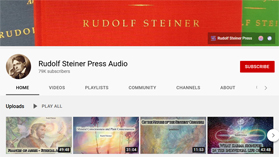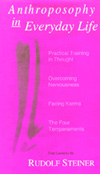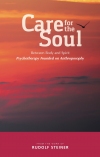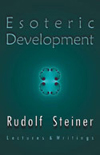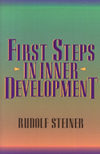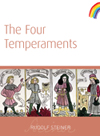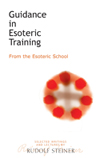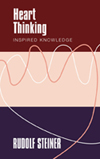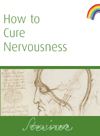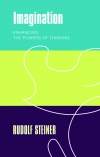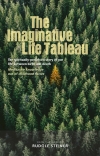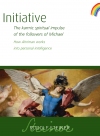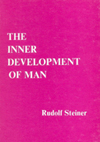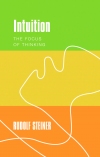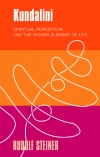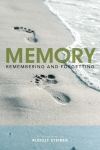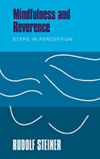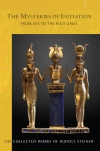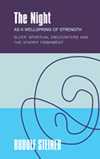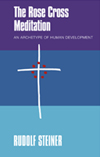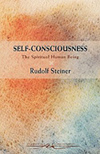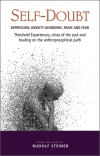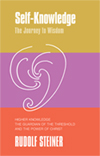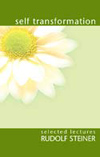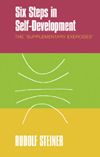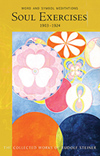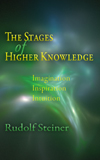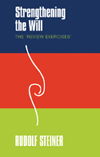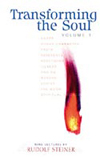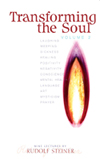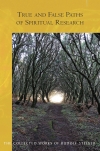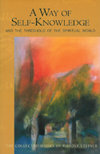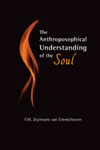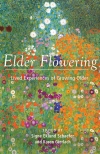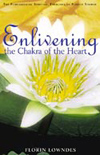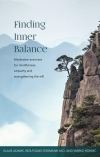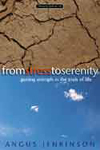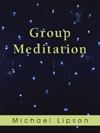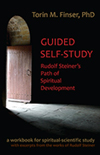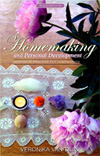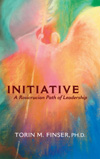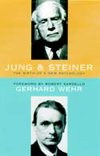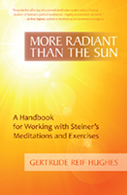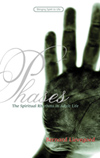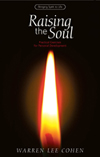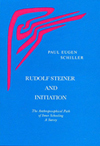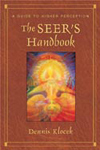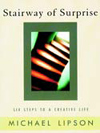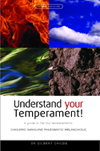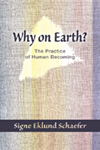
- RUDOLF STEINER
- OTHER AUTHORS
-
PERSONAL DEVELOPMENTRUDOLF STEINER
ANTHROPOSOPHY IN EVERYDAY LIFE
A compilation of four of Rudolf Steiner's best-loved lectures: 'Practical Training in Thought', 'Overcoming Nervousness', 'Facing Karma', and 'The Four Temperaments'.
Between Body and Spirit – Psychotherapy Founded on Anthroposophy
‘We must draw the slumbering soul away from the darkness of sleep so that it no longer vanishes from its own scrutiny but stands before itself as a being of pure spirit which, in volition, is creatively active through – yet also beyond – the body.’ – Rudolf Steiner
Wisdom and Love
An Almanac for the Soul
Rudolf Steiner’s inspiring words provide rich and nourishing thoughts and ideas for self-development and spiritual enlightenment. Daily Contemplations offers a separate passage from Steiner’s lectures – a special gift upon which to reflect – to accompany each day of the year. Carefully selected by Jean-Claude Lin, the quotations are sourced from lectures and addresses that Steiner gave on the specific day in question. Thus, the ordering is not arbitrary but arises from the historical fact of the lectures themselves.
Lectures and Writings
"You should not have any mystical ideas about meditation, nor should you think it is easy. Meditation must be completely clear, in the modern sense. Patience and inner soul energy are needed, and, above all, it depends on an act that no one else can do for you: it requires an inner resolve that you stick to. When you begin to meditate, you are performing the only completely free activity there is in human life." Rudolf Steiner
FIRST STEPS IN INNER DEVELOPMENT
Rudolf Steiner is perhaps best known for his influence and wisdom in the fields of education, agriculture, medicine, science, and art.
"The two streams in the human being combine to produce what is commonly known as a person's temperament. Our inner self and our inherited traits co-mingle in it. Temperament is an intermediary between what connects us to an ancestral line and what we bring with us... Temperament strikes a balance between the eternal and the ephemeral..."
From the Esoteric School
Selected from material given by Rudolf Steiner to members of his Esoteric School (1904-14), this volume features exercises, meditations and practices for spiritual self-development. In contrast to oriental methods of spiritual training, they derive from the western, Rosicrucian stream and are fully adapted to modern consciousness.
Inspired Knowledge
The concepts of ‘thinking with the heart’ or ‘emotional intelligence’ are often used today, usually in contrast to intellectual thought. When Rudolf Steiner used the phrase ‘heart thinking’, however, he meant it in a very specific sense. Drawn primarily from his lectures, the compiled texts in this anthology illuminate his perspective – that heart thinking is intimately related to the spiritual faculty of Inspiration. The heart, he says, can become a new organ of thinking through the practice of exercises that work towards the transformation of feeling, shedding its personal and subjective character.
"It is not always right to send someone to the chemist for some medicine when he's ill. Instead we should organize our lives in a way that renders us less susceptible to illness, or alleviates its impact. Disorders will impinge on us less severely if we strengthen the ego's influence on the astral body, the astral body's influence on the etheric and the etheric on the physical."
Enhancing the Powers of Thinking
Rudolf Steiner differentiated clearly between the spiritual concept of Imagination and our everyday understanding of the word. As living, pictorial thinking, Imagination is a primary aspect of the contemporary path of inner schooling – the first of three levels of initiate knowledge and cognition. Imagination leads us into a world of flowing, living pictures: a realm of soul and spirit in which everything is in continual movement.
The spiritually-perceived story of our life between birth and death
Meditative knowledge out of childhood forces
Many will be familiar with the notion that a person at the point of death sees their life flash before them. Rudolf Steiner describes that when the spiritual bodies separate from the physical body, the etheric body of the dying person is revealed, giving a panoramic overview of their earthly life. This etheric body contains everything we have experienced in our consciousness and kept in memory. The etheric not only generates and sustains all life, but encompasses the life forces out of which we shape our existence.
The karmic spiritual impulse of the followers of Michael
How Ahriman works into personal intelligence
‘Be a person of initiative, and take care that the hindrances of your own body, or hindrances that otherwise confront you, do not prevent you from finding the centre of your being, where the source of your initiative lies. Likewise, you will find that all joy and sorrow, all happiness and pain, depend on finding or not finding your own individual initiative. – Rudolf Steiner, Dornach, 4 August 1924
The Focus of Thinking
Rudolf Steiner draws a clear distinction between the spiritual meaning of the word Intuition and its ordinary definition. As the highest form of spiritual perception, Intuition has an existential significance for our process of knowledge. Through systematic schooling, thinking can be developed into an intuitive organ by means of which the spiritual can consciously be understood and penetrated. Intuition can reveal the essence of the spirit, the processes through which human beings and the world came into existence, and the events in our life after death. In his later works, Steiner spoke of Intuition as a form of supersensible knowledge that could provide direct insight into practical life, as exemplified here in his commentary on geometry, architecture, education, medicine, eurythmy, painting and the social organism.
Spiritual Perception and the Higher Element of Life
In Hindu tradition, the concept of kundalini refers to a form of primal energy located at the base of the spine. Through traditional Eastern methods, efforts were made to ‘awaken’ the kundalini in order to achieve transformed consciousness. Rudolf Steiner offers an entirely new perspective, integrating the kundalini idea into his spiritual philosophy. This anthology contains all relevant comments and notes by Steiner on the theme, highlighting how his thinking evolved. At the same time, it accentuates the differences – and similarities – between Western and Eastern spiritual paths, and in the process reveals what is new and original about Steiner’s esoteric teachings.
Remembering and Forgetting
What is the meaning of memory in the information age? When all knowledge is seemingly digitised and available for reference at any time, do we actually need human memory? One consequence of the proliferation of digitization is the deterioration of our capacity to remember – a symptom that is apparent in a steady increase in dementia within contemporary society. Rudolf Steiner indicates that memory is the determining factor in awareness of oneself. Even a partial loss of memory leads to loss of self-consciousness and the sense of our ‘I’. Thus, memory is crucial for the development of I-consciousness – not only for the individual, but for humanity as a whole.
Steps in Perception
Contemporary interest in the meditative schooling of mindfulness is usually associated with Eastern traditions. Rudolf Steiner spoke of the same phenomenon, although he used the terms ‘attentiveness’ and ‘dedication’ – or, combining these two, ‘pure perception’. This way of mindfulness and reverence is not in conflict with spiritual paths founded on thinking or pure thought. However, as the texts in this anthology indicate, methods based exclusively on thinking cannot be successful if they are not supported by perception, feeling and will.
From Isis to the Holy Grail
In a concise study, Rudolf Steiner presents an inspirational sketch of the evolution of the Mysteries – from ancient Persia through Egypt and Greece, to the Christian era and the present day. He traces the line of initiates from Egyptian divinities Isis and Osiris to Moses, King Arthur’s Round Table and the Holy Grail in the twelfth century. Steiner focuses on the process of initiation as a historical topic: how initiation worked in ancient Egypt and in the late Middle Ages. But his presentation is also inspirational, leading to the question: How can we advance to initiation now? He underscores the potential for achieving enlightenment today without a teacher in the flesh, and explains the four stages of the process towards initiation. He also highlights the need for strenuous efforts to overcome the subtle power of evil – in the form of Lucifer and Ahriman – through selfless work.
as a Wellspring of Strength
Sleep, Spiritual Encounters and the Starry Firmament
‘I fall asleep. Until I awaken my soul will be in the world of spirit, and there will meet the guiding impulse-giver of my earthly life, my genius, who dwells in the world of spirit, hovering round my head…’ – Rudolf Steiner
An Archetype of Human Development
The Rose Cross meditation is central to the western – Rosicrucian – path of personal development as presented by Rudolf Steiner. Steiner repeatedly referred to the meditation as a ‘symbol of human development’ that illustrates the transformation of the human being’s instincts and desires. These work unconsciously in the soul, and in thought, feeling and will. Through personal development, the ‘I’ – the essential self – can gain mastery over these unconscious forces of the soul.
The Spiritual Human Being
The lectures in this book were delivered by Steiner in 1921. Today, their content remains valid and the world situation even more desperate and in need of change in keeping with spiritual-scientific knowledge. The need for developing "consciousness of the self as the spiritual essence of the free, individualistic, single-personality human being" is one of Steiner's unique contributions to the evolving history of humankind. This book marks another milestone on that path.
Depression, Anxiety Disorders, Panic and Fear
Threshold experiences, crises of the soul and healing on the anthroposophical path
Mental and emotional disorders have reached epidemic levels in Western societies. Self-doubt, panic-attacks, anxiety disorders and personal fears of all kinds present major challenges to contemporary medical science. Rudolf Steiner’s spiritual research offers a startlingly original and complementary contribution to the problem. True insight into psychological issues requires knowledge of the influences of spiritual beings, he suggests. In everyday life we are all confronted with metaphysical entities that can hinder or progress our development. Many forms of anxiety and self-doubt derive from such meetings on the border – or threshold – of our consciousness. Further, these ‘threshold experiences’ are exacerbated today by a general loosening of the subtle bodies and components of the human soul.
The Journey to Wisdom
Higher Knowledge, the Guardian of the Threshold and the Power of Christ
Many spiritual traditions speak of a ‘guardian’ or ‘dweller’ who protects the threshold to the spiritual world, warning the unprepared to pause in their quest for access to higher knowledge. The Guardian reveals the consequences of our negative actions and points to the full reality of our untransformed nature. This experience is said to be one of the deepest and most harrowing on the inner path, but is an essential precondition to any form of true initiation.
Selected Lectures
At the heart of Rudolf Steiner's spiritual philosophy is the path of inner development leading to personal transformation. Steiner shows how, through specific meditative exercises, it is possible to break out of the restricted world of everyday consciousness. He gives advice on the development of inner qualities such as clear thinking, inner tranquillity and positivity, which lay a necessary foundation for esoteric work.
The 'Supplementary Exercises'
The so-called 'supplementary exercises' - to be carried out alongside the 'review exercises' and meditation - are integral to the path of personal development presented by Rudolf Steiner. Together they form a means of experiencing the spiritual realm in full consciousness. Meditation enlivens thinking, the review exercises cultivate the will, whilst the supplementary exercises educate and balance feeling. Conscientiously practised, this path of self-knowledge and development has the effect of opening a source of inner strength and psychological health that soon make themselves felt in daily life.
Word and Symbol Meditations
"The whole world stands facing the human soul—dark, unknown as the blue of the sky. But what is unknown comes. The human soul must feel this coming as its own extinguishing. Sensing this self-extinguishing is followed by the right to re-create oneself anew from the outer world that has been absorbed.... "I am 'I.'"
THE STAGES OF HIGHER KNOWLEDGE
Imagination, Inspiration, Intuition
Records some of Steiner's early esoteric instructions, revealing how he became a pioneer of modern inner development and spiritual activity. He carefully guides the reader from an ordinary, sensory-based 'material mode of cognition', through the higher levels of knowing he calls Imagination, Inspiration and Intuition.
The 'Review Exercises'
The review exercises bring the experiences of our daily lives to full awareness. By directing our attentive gaze to what has happened - whether in a single day or in whole phases of life - we kindle light in our will. Undertaking such a review backwards, in reverse sequence, or from an 'external perspective', requires a huge inner effort as we establish distance between ourselves and our daily experiences.
TRANSFORMING THE SOUL - VOLUME 1
The spiritual-scientific investigator has ... to transform the soul itself into an instrument; then - when his soul is awakened and he can see into a spiritual world - he experiences, on a higher level, a similar great moment as blind people do when, having been operated upon, they look at a world they have not seen before.
TRANSFORMING THE SOUL - VOLUME 2
Those who observe human nature with regard to the smallest things will find that everyday experiences can also lead to an understanding of the greatest actualities...'
TRUE AND FALSE PATHS OF SPIRITUAL RESEARCH
In these much-valued lectures, Rudolf Steiner begins by positing the question, ‘Why investigate the spiritual worlds at all?’ He goes on to explore the contemporary need for spiritual knowledge and the authentic paths that can lead to it.
And the threshold of the spiritual world
I hope that reading this book can become a kind of inner conversation. If this conversation unfolds in such a way that it reveals the hidden inner forces that can be awakened in every soul, then reading this book may lead to genu?ine, inner soul work. As a result you may find yourself gradually impelled to undertake that journey of the soul which truly leads to vision of the spiritual world.
-
PERSONAL DEVELOPMENTOTHER AUTHORS
THE ANTHROPOSOPHICAL UNDERSTANDING OF THE SOUL
F. W. Zeylmans van Emmichoven
“If we were to define how the understanding of the soul represented in this book is related to contemporary schools of thought, there are three thinkers—Herder, Goethe, and Steiner—whose spiritual outlook has had a decisive influence. The fact that none of these thinkers became particularly well known in this field is not so surprising if we take into account the comprehensive wisdom and spiritual depth which distinguish their works.”
(from the introduction)Lived Experiences of Growing Older
Edited by Signe Eklund Schaefer and Karen Gierlach
The "social art" of biography work has grown from the insights of Rudolf Steiner's spiritual science—insights that have proved useful in identifying and exploring the archetypal rhythms and milestones of human life. The most well-known, even obvious, of these are the roughly seven-year rhythms of early childhood, childhood, and adolescence, culminating in the transition to adulthood around the age of twenty-one.
ENLIVENING THE CHAKRA OF THE HEART
The Fundamental Spiritual Exercises of Rudolf Steiner
Florin Lowndes
The seer and teacher Rudolf Steiner advised that specific 'accompanying' or 'fundamental' spiritual exercises should always be carried out in conjunction with meditation. While meditation is the foundation of any spiritual path of development, it can pose dangers to normal consciousness. These exercises offer a protection, by helping to develop inner certainty and strength. This is achieved, for example, through the first exercise by concentrating and intensifying the powers of thinking, through the second by developing the control of the will, through the third by mastering the outer expressions of the life of feeling, and so on.
Meditative exercises for mindfulness, empathy and strengthening the will
Klaus Adams
Wolfgang Rissmann M.D. and Marko Roknic
In the midst of life we can find ourselves pulled in many different directions and it is easy to lose our sense of self. Is it possible to find and strengthen the inner core of who we are? Can we rediscover our inner equilibrium and tranquillity without retreating from the world?
Gaining Strength in the Trials of Life
Angus Jenkinson
With a background in business and a life-long interest in spirituality, Angus Jenkinson brings a rich blend of professional and practical know-how, contemporary experience and ancient wisdom to tackling the very modern problem of stress. The sense of being under stress, he suggests, is as much to do with our response to events as the events themselves. Symptoms of stress can be seen as a form of advice, helping us to grow as individuals and develop inner resources needed to meet the inevitable challenges of twenty-first century life. These resources include courage and compassion, freedom and self-determination, clear thinking, positivity and love. Thus equipped, we may approach the adventure of life with serenity, in turn creating less stress for other people.
Michael Lipson
"This book comes from joy." With these words, Michael Lipson begins his offering, the fruit of many years of study and practice. Group Meditation is both a practical introduction to the power of meditation in groups and a challenging review of the meaning of meditation itself.
Rudolf Steiner’s Path of Spiritual Development: A Spiritual-Scientific Workbook
Torin M. Finser
"First, one might ask: Why not just read the first three books? After all, Rudolf Steiner wrote them in such a way that the very act of reading them can awaken new faculties. Who could ever duplicate that? It might even seem presumptuous to select passages from books that were constructed by an initiate. To those who have these and other objections, I have the following response: My hope is that the pages in this book serve as an invitation, so that those who work with this material will then be motivated to go to the original texts and work with them more intensively." —Torin Finser
HOMEMAKING AND PERSONAL DEVELOPMENT
Meditative Practice for Homemakers
Veronika van Duin
"What decides why things go well one day and badly another? The events are the same, the homemaker is the same, yet on one occasion nothing works out for her and on another everything seems miraculously to fall into place. Is there a special ingredient within us that we can tap into and cultivate to generate the longed-for equilibrium?"
A Rosicrucian Path of Leadership
Torin M. Finser, Ph.D.
Torin Finser takes on some of our contemporary challenges and proposes new solutions. Rather than simply "kicking the can down the road", as often happens with issues such as sovereign debts, Middle East conflicts, and environmental issues, Finser calls for individual initiative. Drawing on a variety of rich cultural and spiritual traditions, he makes the case for social change that begins within. To do so, one must first access resources that support initiative and innovation. Key questions discussed in this book include: • How is it possible to live a spiritual life in our materialistic age?
• Can an individual person still make a difference?
• How can we use a whole-systems approach to innovation?
• How can planetary wisdom help us find appropriate leadership styles?
• What are the inner conditions needed to work with the transcendent Self?
• In the swirl of multi-tasking, how can we find moments of solitude and reflection?The Birth of a New Psychology
Foreword by Robert Sardello
Gerhard Wehr
What is the difference between soul and spiritual consciousness? Or the process of individuation and the development of individuality? What are Jung's and Steiner's views on the Grail, dreams, life after death, alchemy, and sexuality?
A Handbook for Working with Steiner's Meditations and Exercises
Gertrude Reif Hughes
"In this invaluable handbook, Gertrude Reif Hughes, in addition to providing us a comprehensive introduction, has given what has been so long needed in connection with Rudolf Steiner's verses and exercises - the benefit of a deep and evolving personal experience in working with them." - Frederick Dennehy, attorney
The Spiritual Rhythms in Adult Life
Bernard Lievegoed
'The human biography is a symphony which each individual personally composes'.
Practical Exercises for Personal Development
Warren Lee Cohen
In a world of rising tension and stress it is not uncommon to feel dominated and overwhelmed by the events of life. Raising the Soul, a practical guide to gaining a firm anchor and taking control of one's situation, is based on seven contemplative exercises interpreted from the work of Rudolf Steiner.
The Anthroposophical Path of Inner Schooling. A Survey
P. E. Schiller
Schiller systematically characterizes the anthroposophic path of inner spiritual training, drawing on Rudolf Steiner's writings and lectures over an extended period of time.
A Guide to Higher Perception
Dennis Klocek
In this practical and accessible guidebook, Dennis Klocek, building on the alchemical tradition and the Western path of initiation developed by Rudolf Steiner, shows how the soul's latent ability can be awakened by conscious acts of will and rhythmical practices. The practices begin wherever we are in our everyday lives and take the seeker through the levels of concentration - the ability to create and hold an inner image; contemplation - the ability to transform the image and make it dynamic; and meditation - the ability to reverse the image, or think it backward into inner silence.
Six Steps to a Creative Life
Michael Lipson
Stumbling through life, gazing at the stars, we can miss the greatest treasure beneath our feet. For the ordinary faculties of our soul - how we think, how we feel, how we act - are the rough and fallen forms of our highest spiritual capacities.
A Guide to the Four Temperaments: Choleric, Sanguine, Phlegmatic, Melancholic
Dr Gilbert Childs
How can we better understand ourselves and others?
Biography and the Practice of Human Becoming
Signe Eklund Schaefer
This book starts from the premise that each of our lives expresses uniqueness of spiritual intention within the unfolding of universal rhythms and possibilities. Can we wake up to the developmental opportunities offered to us through different life phases? Are we able to step out of the narrowness of the dualistic nature-nurture argument and experience that we are both more than our genetic composition and more than a product of the social and educational influences that have shaped us? Can we come to appreciate the learning that our ‘I’ has received through heredity, ethnicity, schooling, and gender without losing a sense of our true individuality?

